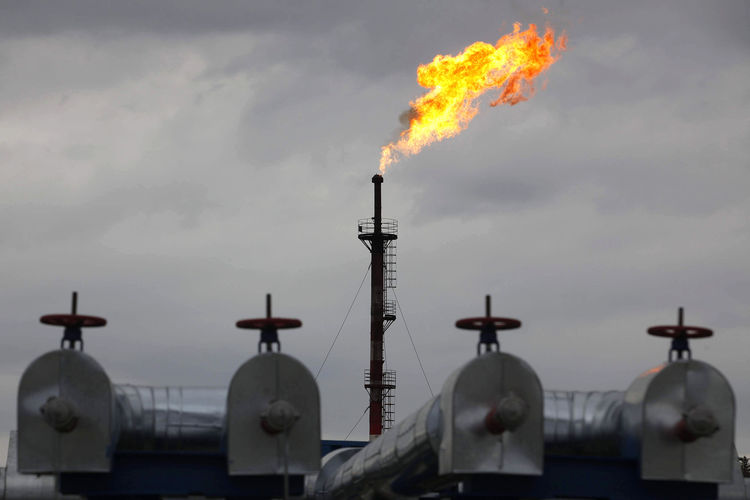- Gas Flaring Rises by 27%, Says NNPC
The volume of natural gas flared by oil and gas companies in the country has hit its highest level in more than a year, as it increased to 27.4 per cent in August.
Latest data from the Nigerian National Petroleum Corporation showed that a total of 28.51 billion cubic feet was flared in August, up from the 22.38 Bcf wasted in July.
It said a total of 239.03Bcf of natural gas was produced in August, translating to an average daily production of 7,710.79 million standard cubic feet per day.
The corporation stated, “Out of the 237.65Bcf of gas supplied in the month, a total of 137.36Bcf of gas was commercialised, comprising of 31.72 Bcf and 105.64 Bcf for the domestic and export markets, respectively. This translates to an average daily supply of 1,023.35mmscfd of gas to the domestic market and 3,407.94 mmscfd of gas supplied to the export market.
“This implies that 57.80 per cent of the average daily gas produced was commercialised, while the balance of 42.19 per cent was either re-injected, used as upstream fuel gas or flared. Gas flare rate was 12 per cent for the month of August 2017 i.e. 919.73 mmscfd compared with average gas flare rate of 10.15 per cent i.e. 734.56 mmscfd for the period August 2016 to August 2017.”
The NNPC said a total of 628 mmscfd was delivered to the gas-fired power plants in August to generate an average electricity of about 2,307 megawatts, compared with July, where an average of 689 mmscfd was supplied to generate 2,655MW.
According to the report, the total gas supply for the period, August 2016 to August 2017, stood at 2.866 Tcf, out of which 380.31 Bcf and 1.276 Tcf was for the domestic and export markets, respectively and commercialised, while non-commercialised stood at 1.209 Tcf.
The Group Managing Director, NNPC, Dr. Maikanti Baru, said recently that the corporation envisaged a near zero flare in the not too distant future with adequate infrastructure and frameworks being put in place.
“Government’s intentions to develop this market will be made clear to the prospective investors,” he added.
According to the recently approved National Gas Policy, the flaring of natural gas that is produced in association with oil is one of the most egregious environmental and energy waste practices in the Nigerian petroleum industry.
The policy states, “While gas flaring levels have declined in recent years, it is still a prevailing practice in the petroleum industry. Billions of cubic metres of natural gas are flared annually at oil production locations, resulting in atmospheric pollution severely affecting host communities.
“Gas flaring affects the environment and human health, produces economic loss, deprives the government of tax revenues and trade opportunities, and deprives consumers of a clean and cheaper energy source.”
According to the gas policy, the current gas flare penalty of N10 per 1,000 scf of associated gas flared is too low, having been eroded in value over time, and is not acting as intended, as a disincentive.
“Consequently, the low penalty has made gas flaring a much cheaper option for operators compared to the alternatives of marketing or re-injection. The intention of government is to increase the gas flaring penalty to an appropriate level sufficient to de-incentivise the practice of gas flaring, whilst introducing other measures to encourage efficient gas utilisation,” it added.
According to the World Oil Outlook released by the Organisation of Petroleum Exporting Countries on Friday, the largest contribution to future energy demand at the global level is projected to come from natural gas.
It noted, “In absolute terms, demand for gas will increase by almost 34 million barrels of oil equivalent per day, reaching a level of 93 mboe/d by 2040. Its share in the global energy mix will increase by a significant 3.6 percentage points.
“Strong population growth in most developing countries, combined with robust economic development, leads to demand growth for gas in all the relevant sectors: power generation, industry, as well as the residential and commercial sectors.”
The increasing availability of gas on the global market due to the expansion of liquefied natural gas production is also set to contribute to the high growth rates for this energy source, according to the report.

 Naira4 weeks ago
Naira4 weeks ago
 Naira4 weeks ago
Naira4 weeks ago
 Travel3 weeks ago
Travel3 weeks ago
 Jobs4 weeks ago
Jobs4 weeks ago
 Naira3 weeks ago
Naira3 weeks ago
 Naira3 weeks ago
Naira3 weeks ago
 Investment4 weeks ago
Investment4 weeks ago
 Travel4 weeks ago
Travel4 weeks ago




























